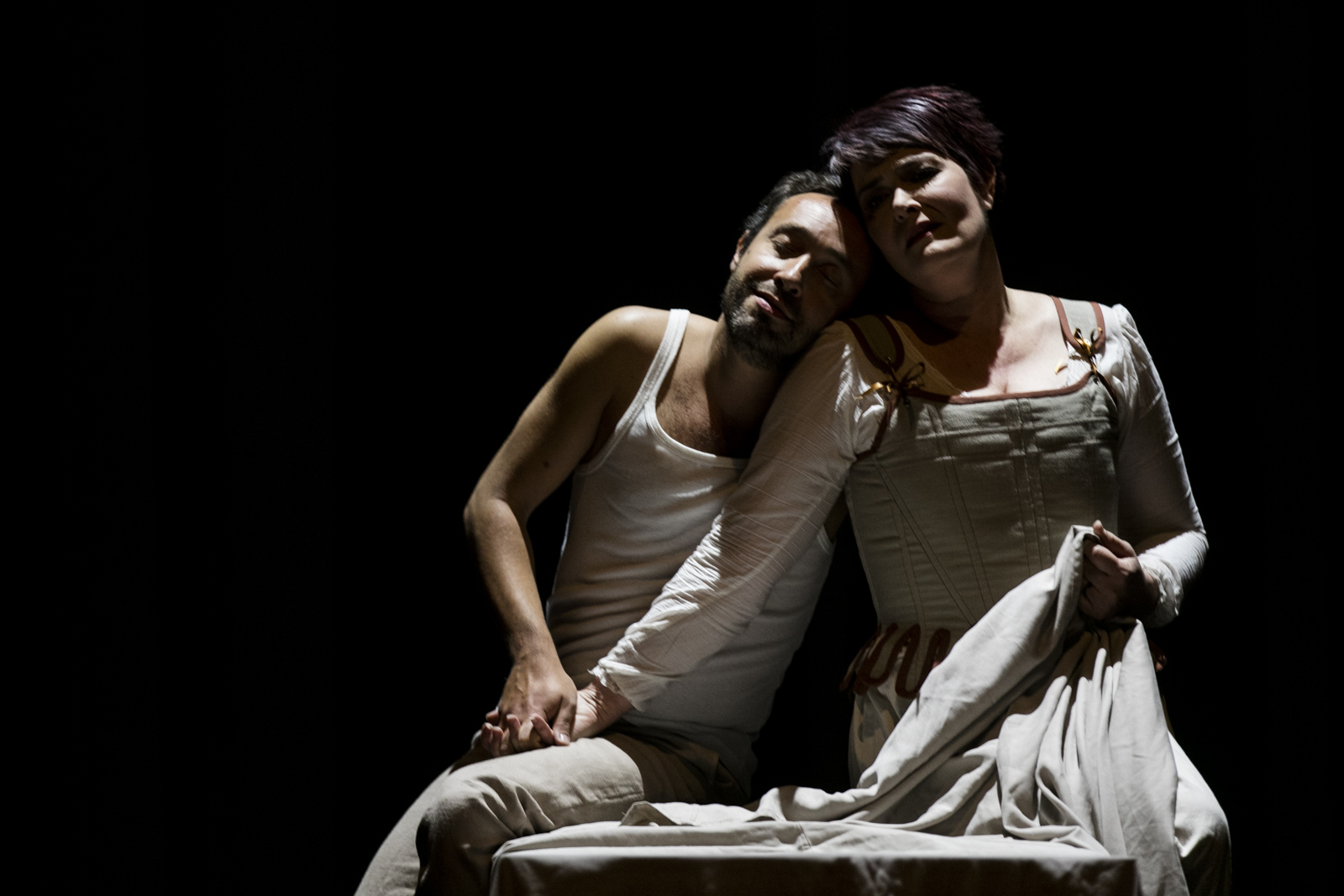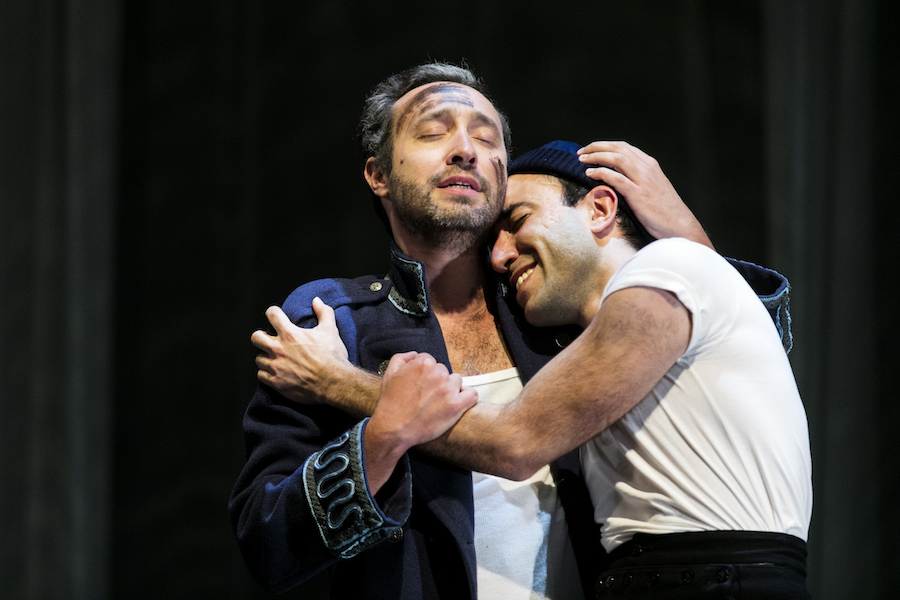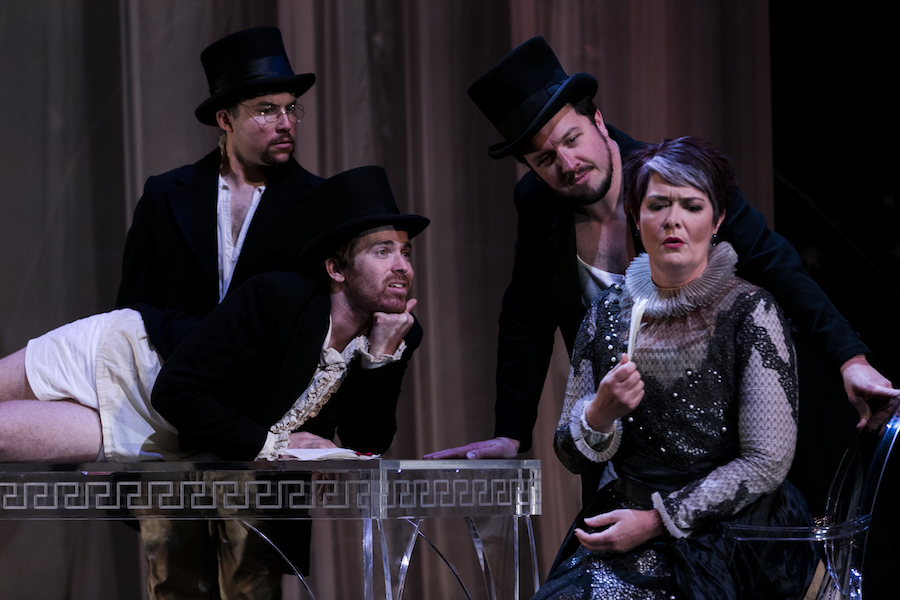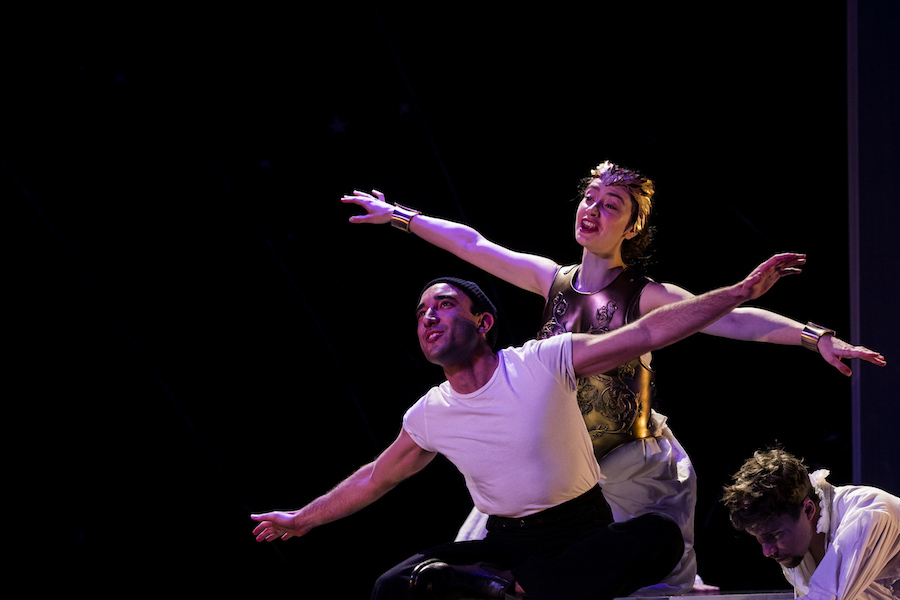While Monteverdi’s The Return of Ulysses might be something of a neglected sibling when compared to his The Coronation of Poppea and Orfeo, its intimate scale and complex emotional landscape makes it every bit as worth seeing as those more dazzling, big-boned works. And in this skilfully realised production from Pinchgut Opera, which represents the completion of its Monteverdi survey, Ulysses is shown to be a very rich piece indeed.
 Fernando Guimarães and Catherine Carby in Pinchgut Opera’s Ulysses. Photos © Brett Boardman
Fernando Guimarães and Catherine Carby in Pinchgut Opera’s Ulysses. Photos © Brett Boardman
Returning to the company after last season’s Artaserse, director Chas Rader-Shieber doesn’t shy away from the work’s preoccupation with enduring love and constancy, unfashionable themes though they may be. Though Giacomo Badoaro’s libretto tends to flatten out or tame the spikier, more compelling aspects of the characters that populate Homer’s Odyssey, Rader-Shieber takes care to add nuance where possible. One such example is the production’s treatment of Ulysses, who is shown to be an ageing war veteran underneath the wily, cocksure exterior. Another is the intelligent handling of Penelope, whose steadfastness here feels naturally established rather than a blunt translation of the source material, as can often be the case.
The clearly defined emotional contours of the work are complemented by Melanie Liertz’s simple but effective set, consisting of a mostly bare stage dominated by white gauze curtains, splendidly lit by Nicholas Rayment, which are eventually drawn back to reveal a map of the stars – an elegant way of mirroring the work’s twin themes of fate and navigation. Liertz’s costumes also go a long way in aiding the drama, heightening moments of pathos – as when Penelope is at last divested of her heavy gown upon being reunited with Ulysses – or introducing witty, caustic touches, like the suitors’ combination of top hat and bloomers.
 Fernando Guimarães and Brenton Spiteri in Pinchgut Opera’s Ulysses
Fernando Guimarães and Brenton Spiteri in Pinchgut Opera’s Ulysses
As usual, musical values are high across the board, beginning with the Orchestra of the Antipodes under Artistic Director Erin Helyard. Playing with great élan and sense of forward propulsion, the band also prove themselves highly attentive to mood, easily shifting between the earthier exchanges of young lovers, the anguish of an abandoned lover and the chattering of a glutton. The continuo playing is similarly accomplished, with Helyard’s pacing of the work just right. What’s more, his affection for this neglected gem is always in evidence, as is his innate stylistic understanding.
Although the cast vary in their facility with the required style, their commitment is never in question. Entirely at home with these demands was Portuguese tenor Fernando Guimarães in the title role. Both vocally and dramatically he imparted a sense of the emotional strain of Ulysses’ long-delayed return, as well as an intelligent man’s frustration at being forever stymied by the gods. A stylish technician as well, he possesses a fine, ringing top and handles the more florid passagework with ease. Most important of all, Guimarães brings the required intensity to the part, his repeated cries of “Telemaco” in the reunion scene between father and son perfectly judged and highly moving.
 Nicholas Tolputt, Douglas Kelly, Wade Kernott and Catherine Carby in Pinchgut Opera’s Ulysses
Nicholas Tolputt, Douglas Kelly, Wade Kernott and Catherine Carby in Pinchgut Opera’s Ulysses
Catherine Carby’s Penelope proves just as powerful a portrayal, the lonely and precarious conditions of her daily life made vivid. Her opening lament Di misera regina was rivetingly done, demonstrating an ease with declamation and an elegant sense of line. Avoiding the usual anguish for a deeper sense of sorrow, the mezzo made this moment all the more affecting, as she did in her closing duet with Guimarães which was suffused with a sombre joy. An intelligent characterisation full of telling details, Carby sang with radiant pathos throughout.
Other standouts included Brenton Spiteri’s Telemaco, who invested his clarion tenor with a tender, subtle quality when needed. A persuasive stage presence, he had an easy rapport with both Guimarães and Carby, giving the audience insight into his character’s painful maturation, while his reunion scene with Ulysses was a shining vocal and dramatic moment. Soprano Lauren Lodge-Campbell showed herself especially versatile, inhabiting four roles in total. Although her characterisation of the goddess Minerva needed a greater sense of gravitas and urgency, she demonstrated great beauty of voice and natural sense of line.
 Brenton Spiteri and Lauren Lodge-Campbell in Pinchgut Opera’s Ulysses
Brenton Spiteri and Lauren Lodge-Campbell in Pinchgut Opera’s Ulysses
Tenor Jacob Lawrence was a confident stage and vocal presence as both Giove and Eumete, while tenor Mark Wilde displayed ample comic timing as Iro, revealing a seemingly endless palette of vocal colour in his long monologue. As the lovers Melanto and Eurimaco, soprano Roberta Diamond and tenor Douglas Kelly were suitably fresh and ardent of voice, though the latter was sometimes inelegant when it came to matters of phrasing. Diamond also impressed as Amore and Giunone, bringing plenty of spunk to the first and conviction to the second. As the suitors, countertenor Nicholas Tolputt, bass Wade Kernot and Kelly are a vibrantly characterised trio, with Kernot a formidable Nettuno.
In Pinchgut’s hands, Monteverdi’s The Return of Ulysses demonstrates its power as a vital, utterly humane drama.
Pinchgut Opera’s The Return of Ulysses is at City Recital Hall, Sydney until June 19











Comments
Log in to join the conversation.